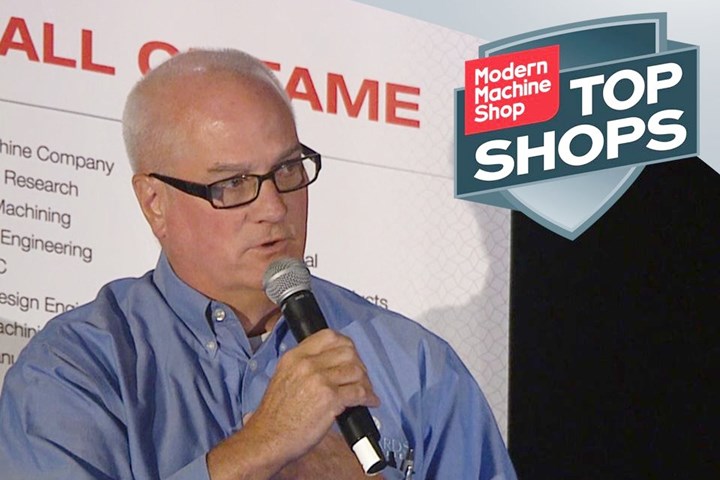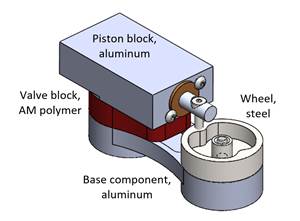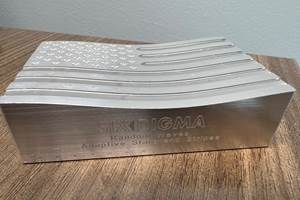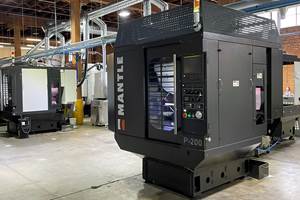Machine Monitoring Both Challenges and Benefits Shop Culture
How does a shop deal with the “Big Brother” feeling that comes from implementing machine tool data collection? Part of the answer is the benefit to employee experience that this data collection will make possible. Watch video from the Top Shops Conference.
How does a shop deal with the “Big Brother” feeling among employees that results from implementing machine-tool-performance data collection, and is this feeling sufficient reason not to adopt machine monitoring?
Bill Metz of valve manufacturer Richards Industries was asked this two-part question at Modern Machine Shop’s recent Top Shops Conference. Richards Industries is a Top Shops Honors Program winner, and Mr. Metz appeared on stage in a Q&A session with representatives from other Honors Program companies. For Richards, machine monitoring has played a major role in the company’s continuous-improvement success.
The question about Big Brother feelings was immediately followed by a question citing the company’s recognition as being one of the better places to work in Cincinnati. I made the observation that the two questions are connected. The goal of measuring the effectiveness of the process is to identify opportunities to improve. Finding shortcomings to address can be uncomfortable in the short term, but in the long term, the effort produces a healthy, thriving company in which the work of all of the employees ultimately delivers more value.
Watch the video of the exchange above or read the transcript below.
Speaking of Top Shops: If you want the chance to see where your shop stands among other shops, fill out the 2018 Top Shops Benchmarking Survey by the end of this month. In addition to a summary of the survey finding, you’ll receive a report customized to your shop. As with data from machine monitoring, data from other shops’ reported performance can help you base your own improvement efforts on hard information rather than perception.

Transcript:
Audience Member 1
Bill, in your introduction, you mentioned that you implemented a machine monitoring system. Now, this came with a couple of challenges you had to overcome, and one of the challenges that you touched on was that it had a bit of a Big Brother culture among some of your operators on the floor. So, I really want to understand what sort of strategies you implement to get around that Big Brother feeling of being watched with your operators. What sort of strategies did you use to overcome that and get to where you are today?
Bill Metz, Richards Industries
Well, to be honest, I'm not sure we've completely overcome it. Okay, it's an ongoing battle. It’s an ongoing challenge. We implemented the machine data collection two years ago. [The Big Brother feeling] has really subsided in the last 12 to 18 months, but the initial concern was, “You're watching my every move,” and in reality, we're not. We're looking for major opportunities to get our overall equipment effectiveness (OEE) up to where we think it should be when we started monitoring.
We were at 38 percent [OEE]. We’re currently in the mid-50s, and basically that's a huge increase in our productivity and effectiveness. We've done a number of things to deal with that.
But I think one of them was just the operators themselves looking at the number and saying, “Wow, I was only effective 40 percent last night; what could I have done different?” as much as anything.
Audience Member 2
This is a question for Bill. In this region, Richards Industries is a fine company and has a wonderful history. I think it's safe to say that you're one of the smartest factories around, and that took a lot of guts and a lot of vision to make the transformation even though you were very profitable, great company for many, many years. My question is: How important is the continuous-improvement process to Richards? How much emphasis do you place on it, and how has that contributed to your company being [awarded among manufacturers] always every year “one of the best places to work in Cincinnati?”
Bill Metz
Continuous-improvement culture has been part of Richards industries. I’m one of the owners. I joined the company 11 years ago, and myself and three other people bought the company from Mr. Gilbert Richards 10 years ago, actually 10 years ago today. And Mr. Richards had the continuous-improvement mentality. He was a big supporter of lean when the company started that over 20 years ago, and then continuous improvement is just continuing on with that. I've been a huge supporter, pusher, or whatever you want to call it of lean and continuous improvement. I actually have a gentleman named Bob Lucy who was our continuous-improvement manager and his main focus is driving day-to-day improvements through lean, and now also he's really led the implementation of our machine data collection as well as our order data management on the shop floor.
Peter Zelinski, Modern Machine Shop
I actually think these two questions connect that Bill just got. So, he was just asked a question about retention and employee culture, and his answer went to continuous improvement and the effectiveness of the shop floor and the changes they're making. And the question before that was on machine monitoring and, sort of, the culture of implementing that.
Data is difficult—forcing everybody to look concretely at the numbers and what they show. There's the Big Brother problem that you mentioned and maybe haven't solved yet, but I feel like there's a real positive too, in that you've got this data that vindicates the value of the continuous improvement you're putting place. And [that data] is able to persuade the key staff that we’re working. We’re part of something that is moving forward, improving and becoming more valuable.
Related Content
Solve Worker Shortages With ACE Workforce Development
The America’s Cutting Edge (ACE) program is addressing the current shortage in trained and available workers by offering no-cost online and in-person training opportunities in CNC machining and metrology.
Read MoreBuilding Machines and Apprenticeships In-House: 5-Axis Live
Universal machines were the main draw of Grob’s 5-Axis Live — though the company’s apprenticeship and support proved equally impressive.
Read MoreInside Machineosaurus: Unique Job Shop with Dinosaur-Named CNC Machines, Four-Day Workweek & High-Precision Machining
Take a tour of Machineosaurus, a Massachusetts machine shop where every CNC machine is named after a dinosaur!
Read MoreIn Moldmaking, Mantle Process Addresses Lead Time and Talent Pool
A new process delivered through what looks like a standard machining center promises to streamline machining of injection mold cores and cavities and even answer the declining availability of toolmakers.
Read MoreRead Next
5 Rules of Thumb for Buying CNC Machine Tools
Use these tips to carefully plan your machine tool purchases and to avoid regretting your decision later.
Read MoreRegistration Now Open for the Precision Machining Technology Show (PMTS) 2025
The precision machining industry’s premier event returns to Cleveland, OH, April 1-3.
Read MoreRego-Fix’s Center for Machining Excellence Promotes Collaboration
The new space includes a showroom, office spaces and an auditorium that will enhance its work with its technical partners.
Read More














.jpg;maxWidth=300;quality=90)


.jpg;maxWidth=300;quality=90)








